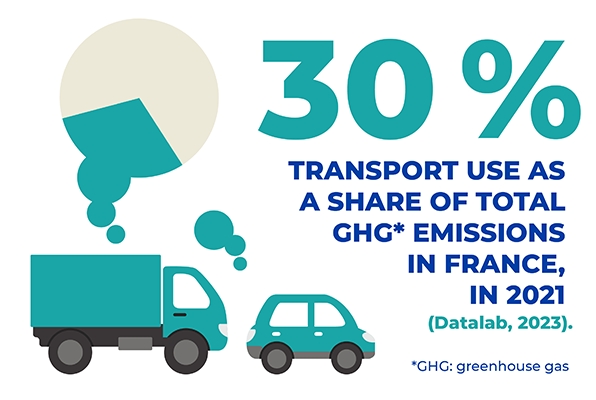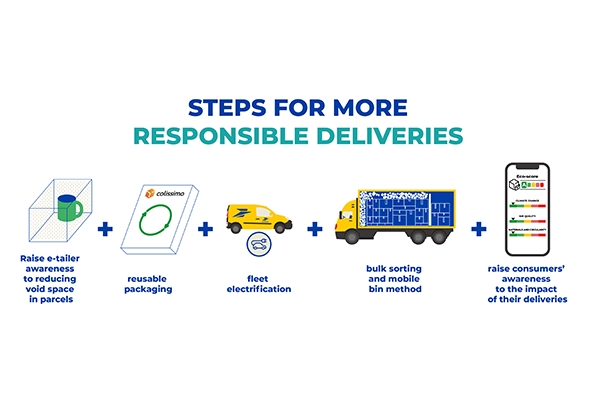Many countries, including France, have committed to achieving by 2050. This resolution is considered imperative by climate experts in order to be able to limit global warming to 1.5°C, in line with the objective of the Paris Agreement adopted in 2015.
La Poste, a company with a mission, is anticipating and aiming to achieve zero net emissions by 2040, 10 years before the deadline set by the Paris Agreement. As one of the world's best-rated companies for its commitment to the environment, La Poste continues to lead the way.
This objective requires us to extend the measurement of the Group's Greenhouse gases to all its sources of emissions, to continue to drastically reduce them and to rethink our long-term approach with a view to adapting to future climate challenges and sequestering residual emissions that cannot be reduced.
According to the 2018 report by the Intergovernmental Panel on Climate Change (IPCC), to limit global warming to 1.5°C and avoid the most catastrophic effects of climate change, the world needs to halve its CO2 emissions by around 2030 and reach net-zero by 2050. The IPCC considers "net-zero" (or zero net emissions) to be the level at which global anthropogenic greenhouse gas emissions (generated by human activities) will be totally balanced by anthropogenic absorptions. In October 2021, the Science Based Target Initiative will publish the first standard for companies to implement net-zero targets based on climate science.
Measuring La Poste group's carbon footprint
Since 2012, this footprint has led the group to measure and assess its greenhouse gas emissions:
With its historic business of delivering mail and parcels, which accounts for more than 60% of the group's turnover, La Poste group is a logistics company, consuming a great deal of transport, mainly road (74%) but also rail, sea (0.01%) and air (14%). It owns more than 90,000 vehicles in France and abroad, not counting the fleets of subcontractors.
The group, with its subsidiary La Poste Immobilier, and more than 9,000 buildings, emits Greenhouse gases (GHGs) linked to heating and electricity supply. These 9,100 buildings are spread throughout Europe, and are linked to the activities of the post office network as well as industrial and logistics activities.
Finally, as an investor, La Banque Postale contributes to the GHG emissions of the projects it supports, either directly or via its customers' savings.
Extended carbon footprint measurement
The ambition of zero net emissions, the expectations and requirements of international standards (SBTi, CDP) and European standards (CSRD) are accompanied by the extension of the measurement of the Group's carbon footprint to better cover its activities and those of its many subcontractors and service providers, from the production of its products and services to the management of its operations.
This measurement approach is based on one of the most restrictive international protocols: the GHG Protocol. Only the carbon footprint of LBP's portfolios is excluded from the process at this stage.
The exhaustive inventory of our 2023 carbon footprint, extended to the whole of the Group's value chain, is estimated at 5.6 M teqCO2. It will be piloted from 2024

Greenhouse gas emissions from transport have increased by 1.9% since 1990.
March 2023 - Source: Ministry of Ecological Transition and Territorial Cohesion
An ambitious trajectory to reduce emissions
The Group is meeting its GHG reduction commitments: the first trajectory validated by the Group in 2019 for the scope of its historical activities in France (Mail, Parcels, Post Offices, Corporate), which provided for a -30% reduction between 2013 and 2025, was achieved and exceeded by the end of 2023, 2 years ahead of schedule, with a measured reduction of -35%.
At the beginning of April 2024, the Group obtained validation from the Science Based Targets (SBTi) initiative of its Net Zero Emission trajectory to 2040. It is the only French company with SBTi certification in the transport, logistics and banking sectors.
Reducing greenhouse gas emissions from mail and parcel services by 90% by 2040

For the delivery business, which is growing directly in line with e-commerce, an analysis of the lifecycle of a parcel has identified the main levers for action: reducing the empty space in each parcel by 25 to 30%, using reusable packaging, continuing to electrify the fleet, and raising consumer awareness of their delivery and consumption choices.
« Bulk storage" and swap bodies, which both maximise carrying capacity and optimise road links, are an important lever in reducing emissions.
37,000 electric vehicles (one of the largest fleets in Europe), including 15,000 electrically-assisted bicycles
80,000 postal workers trained in eco-driving
25 million items of mail and parcels processed in an optimized manner every day, thanks to new loading methods
To prepare for Zero Emission Net and help mitigate climate change, the Group is committed to stepping up its efforts to reduce CO2 emissions using the most advanced methods for measuring greenhouse gases. The acceleration of decarbonisation will be based on a policy of reducing emissions intensity, with decarbonisation levers combining optimisation, innovation, technological advances (low-emission vehicles, SI) and process reengineering.
Reducing the carbon impact of the Group's 9,100 buildings
In France, 100% of the Group's buildings (post offices, industrial sites, etc.) are supplied with electricity from renewable sources. A strategic partnership was set up between La Poste Immobilier and EDF in December 2023 to accelerate the energy transition of the postal estate. The aim of an ambitious programme of works and the creation of a joint venture is to reduce the energy consumption of buildings by 20% and CO2 emissions by 35% by 2030 (base year 2017).
Promoting positive impact projects with Bancassurance
La Banque Postale, a leading player in sustainable finance, is the first bank in the world to have committed to a total withdrawal from the coal, oil and gas sectors by 2030. La Banque Postale has developed an indicator to measure the impact of its activities on the environmental, societal and territorial dimensions. The Global Impact Index (GII), created with WWF France, was introduced in 2023 and covers 64% of the Bank's financing activities. This indicator has enabled the launch of the impact mortgage. This innovative offer in France aims to make La Banque Postale's customers players in the just transition by encouraging them to promote property projects with a positive impact on the environmental, territorial and societal dimensions or to carry out energy renovation work.
At the end of 2023, CNP Assurances had invested €27.7 billion in the energy and ecological transition, with the aim of reaching €30 billion by the end of 2025, compared with €10 billion at the end of 2018. This tripling of green investments in 7 years places CNP Assurances among the most committed insurance companies in this area and contributes to the Caisse des Dépôts group's objectives to accelerate the country's ecological transformation over the coming years.
The Group's reduction trajectories have been submitted to SBTi, which assesses their compatibility with the objective of maintaining global warming at +1.5°C by 2050.
Adapting to climate change
Anticipating the impact on the Group's activities
Climate disruption is affecting and will continue to affect the business world, through its effects on working conditions during periods of intense heat, the intensification of claims, the availability of water, infrastructure, and so on. In order to meet the challenges posed by the physical risks of climate change and to protect its citizens and employees, La Poste group is putting in place the conditions needed to prepare as effectively as possible for these complex times ahead. This is based on a very detailed analysis of the risks and opportunities associated with global warming, whether in terms of buildings, logistics platforms or the work of letter carriers and delivery staff.
Since 2021, the Group has been carrying out sensitivity and exposure studies for the risks of climate change in 2030 and 2050. In 2023, climate projection stress tests were carried out on the property assets of the Services-Courier-Colis division. In 2024, a "transition and adaptation risk" study will be updated in order to draw up transition and adaptation plans.
- Assessment of the current and future impact of global warming on our activities
- Deployment of adaptation work on our assets and organisations, as well as on the health, safety and working conditions of our employees.
Investing in the living world
Investing in the living world is a cornerstone of the Group's adaptation policy.
The erosion of biodiversity and living organisms, the planet's limited resources of all kinds and water management are key factors that have major consequences for many areas of our economies, upsetting many balances and challenging our businesses.
Investing in natural sinks to keep oceans, soils and forests alive is a key part of our response to climate change and the crisis of collapsing biodiversity.
Between now and 2040, the Group will be stepping up its action to help living things, particularly through its Climate+territories programme, which supports 46 projects to help French territories adapt to climate change, with direct impacts on biodiversity and carbon capture.
In addition, La Banque Postale Group is committed to WWF France's "Nature Impact" initiative in France from 2023.
The diversity of the project portfolio from the point of view of territories (projects located in the Group's areas of activity) and environments (oceans, agriculture, forests, etc.) will be one of the key elements of the Group's action in the coming years.
As part of its commitment to Zero Net Emissions in 2040, the choice of initiatives to sequester its annual residual emissions (10% of its emissions are not compressible) will be made as part of this strong commitment to invest in living things.
The Group will pay particular attention to projects that combine Climate and Biodiversity in order to reconcile its Climate (ZEN 2040) and Biodiversity (ZAN 2050) commitments.
